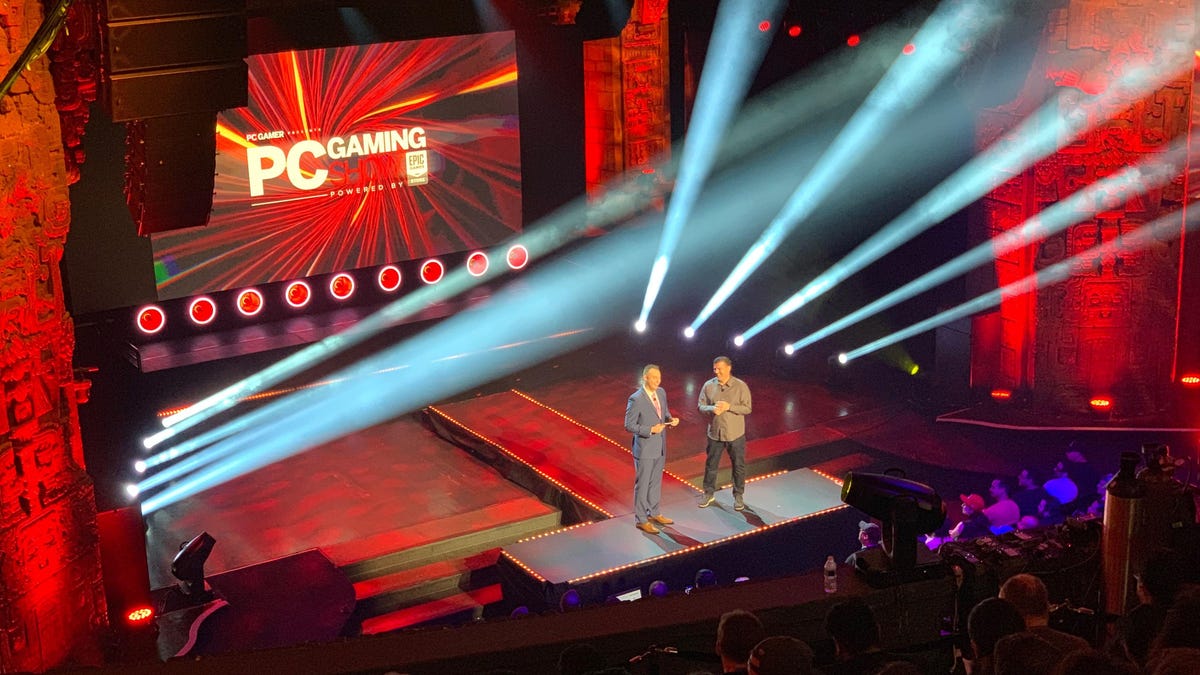How PC games overpowered Xbox, PlayStation and others at E3 2019
Microsoft's and Sony's next consoles are still a year away, but the PC Gaming Show near E3 demonstrates that more powerful PC hardware is already here.

A few moments on Project Scarlett stole the E3 schedule at Microsoft's Xbox E3 press event, despite being barely more than a shot of the logo and some hyperbolic promises that it'll be the most powerful Xbox ever. (I would hope so...)
In truth, PC hardware at E3 today is already as powerful as the next Xbox or PlayStation consoles will be. While console games have dominated the show floor at E3 for many years, dig a little deeper and you'll find a big presence from companies like Intel and Nvidia, as well as high-end PC brands like Alienware.
One E3 open secret is that, no matter which console they're for, many of the game demos played at E3 are actually running on high-end gaming PCs, even if those PCs are hidden under tables or behind curtains.
"A lot of companies will be using PCs. They may not show the PCs, but a lot of people in industry know that PCs are the majority of the hardware that's running the games," says Kevin Wasielewski, CEO of Origin PC, a gaming and performance PC manufacturer. "It looks the best, has all of these features, is going to run the smoothest."
Intel's Honeycomb Glacier dual-screen gaming laptop prototype.
Intel's Lee Machen, general manager of gaming and VR/AR sales, touts the sheer volume of PC gamers as one of the reasons it remains an important E3 category. "Don't be fooled by the volume of press at E3 on consoles," he says. "There's still many, many more people playing games on PC than on the consoles combined, and it drives so much of what you see here."
But to find that sharp focus on PC hardware and software, you'll have to walk a few blocks to the biggest PC-specific event of the week, the PC Gaming Show. This annual event is held at a theater a short walk from the Los Angeles Convention Center. This year's show filled the 1,700-person capacity Mayan Theater and left a crowd waiting outside.
Inside, the usual suspects, from Halo to Doom, were nowhere to be found. Instead, the crowd cheered for PC-centric games (some of which are also coming to consoles) including Zombie Army 4, Baldur's Gate 3 and the long-awaited Shenmue 3. No, the game sequel problem isn't any better on PCs.
Cloudy skies
The idea of cloud gaming, in which game content streams live from a remote server, is both embraced and feared by game companies. Opening the door to new consumers who don't own PC or console gaming hardware is a huge potential opportunity. But who's going to shell out for a $500 console or $1,500 gaming PC when similar experiences can stream from Google's Stadia or Nvidia's GeForce Now to almost any screen?
Most industry voices I've talked to are playing it cool, for now. "When we see something like cloud-based gaming, which has been teased for many many years but is becoming more of a reality, we don't see that as a threat," says Origin PC's Wasielewski. "We think it's going to help our business, since we're on the high end of the spectrum. Anybody who has gaming as a passion and wants the best experience, they're going to look for the best hardware. Something like Stadia, it's not the best version of gaming."
Intel's Machen thinks cloud-based gaming and local performance hardware will join forces in the future. "It's undeniable that workloads of all kinds are moving into the cloud," he says. "The cloud is going to enable much bigger experiences, new ways of doing things in games that we haven't thought about. But I think that's going to be complementary to performance." In other words, the most premium experiences will combine server-side streaming and powerful desktop or laptop hardware for better decoding, faster throughput and even keeping some parts of the game local.
"We are just at the beginning things like Stadia," says Machen. "While there's a lot of excitement and interest in it right now, I really don't see it changing the the PC market, at least the enthusiast gaming PC market, for at least a couple of years."
We're there
CNET is on the ground, covering E3 2019 alongside our sister site, Gamespot. We'll update this page throughout the show as more games are announced.

